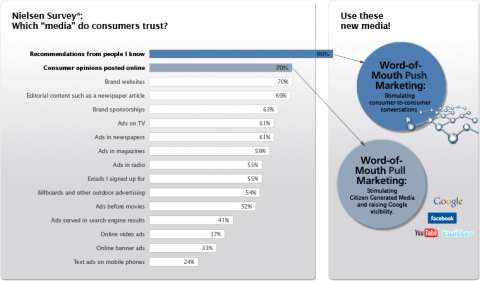‘Word-of-Mouth’
Word of mouth remains the most powerful method of human communication. Human beings are social animals and share experience, stories, and information with each other on a daily basis. They like a restaurant they talk about it. They have a bad experience, they talk about it. They continuously recommend people, places, things, objects, philosophies, religions, etc. The Internet is enabling conversations among human beings that were simply not possible ever before. The conversations are happening at different levels - whether seeking or delivering information, opinions for buying selling, sharing, collaboration, etc. In this era of connectedness the consumer is the boss, and power shifts to the consumer, which is fascinating and scary at the same time. Everything about consumerism changes and the way things used to work no longer work the same.
Markets are conversations. Markets consist of human beings, not demographic sectors. As human beings we trust friends and near and dear ones. In these conversations traditional media helps a great deal to generate awareness, though they are less and less capable of creating credibility among consumers. Recommendations from friends are more valuable than anything that is printed on glossy paper or shown in spectacular moving ads. When it comes to trust, word of mouth ranked #1 (offline) and #2 (online) in recent surveys and is most valued by customers worldwide.

More and more often, consumers’ purchase decisions are influenced by comments, opinions, and experiences Posted online by other consumers, e.g. on social networking sites and communities, on forums, and on customer review sites. Example: When questioned what triggered their initial purchase of a product, a majority of interviewees said it was a “recommendation from family and friends”, e.g. Nokia mobile phones: Word of Mouth (44.1%) vs.TV (6.1%) and print media (13.2%); or Sony Playstation: Word of Mouth (42%) vs. TV (16%) and print media (13.3%)

Companies are encouraging brand advocates to publish their product experiences online, using text, images, and films. They are leveraging happy customers to garner new clients through trusted recommendations, fully taking advantage of the power found in word-of-mouth. As a result, consumer-generated content (CGM) is getting created, that is relevant, credible, and effective in the long term.
References:
- http://company.trnd.com/en/about-word-of-mouth/builds-trust/
- http://company.trnd.com/en/about-word-of-mouth/
- http://www.cluetrain.com/
- http://blog.rewardstream.com/92-of-consumers-trust-word-of-mouth-recommendations-up-18-since-2007/
- http://www.marketing-made-simple.com/articles/word-of-mouth-advertising.htm#.UVh6mzeOXic


